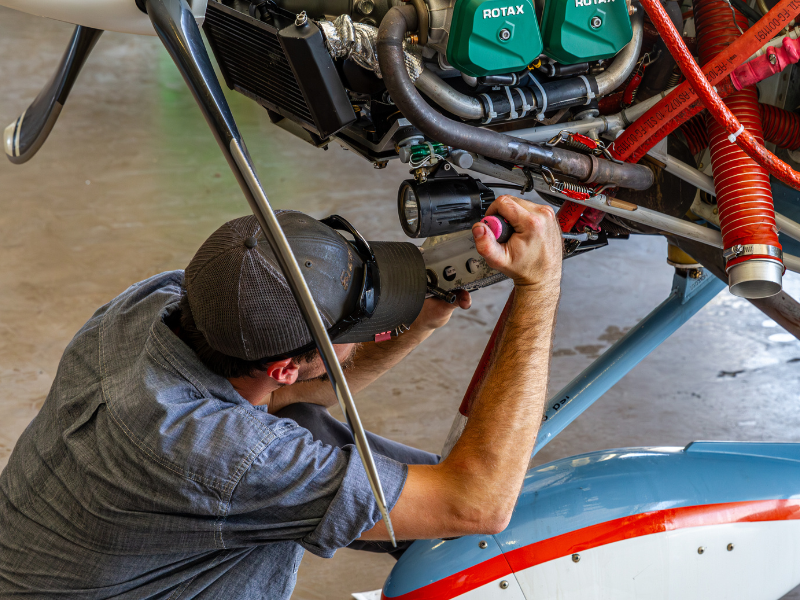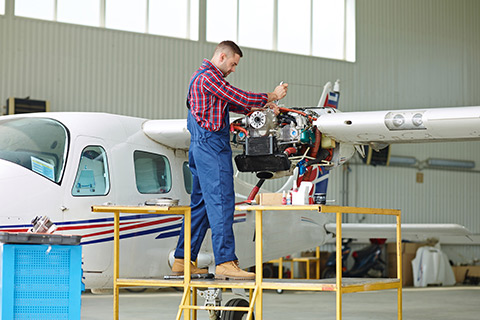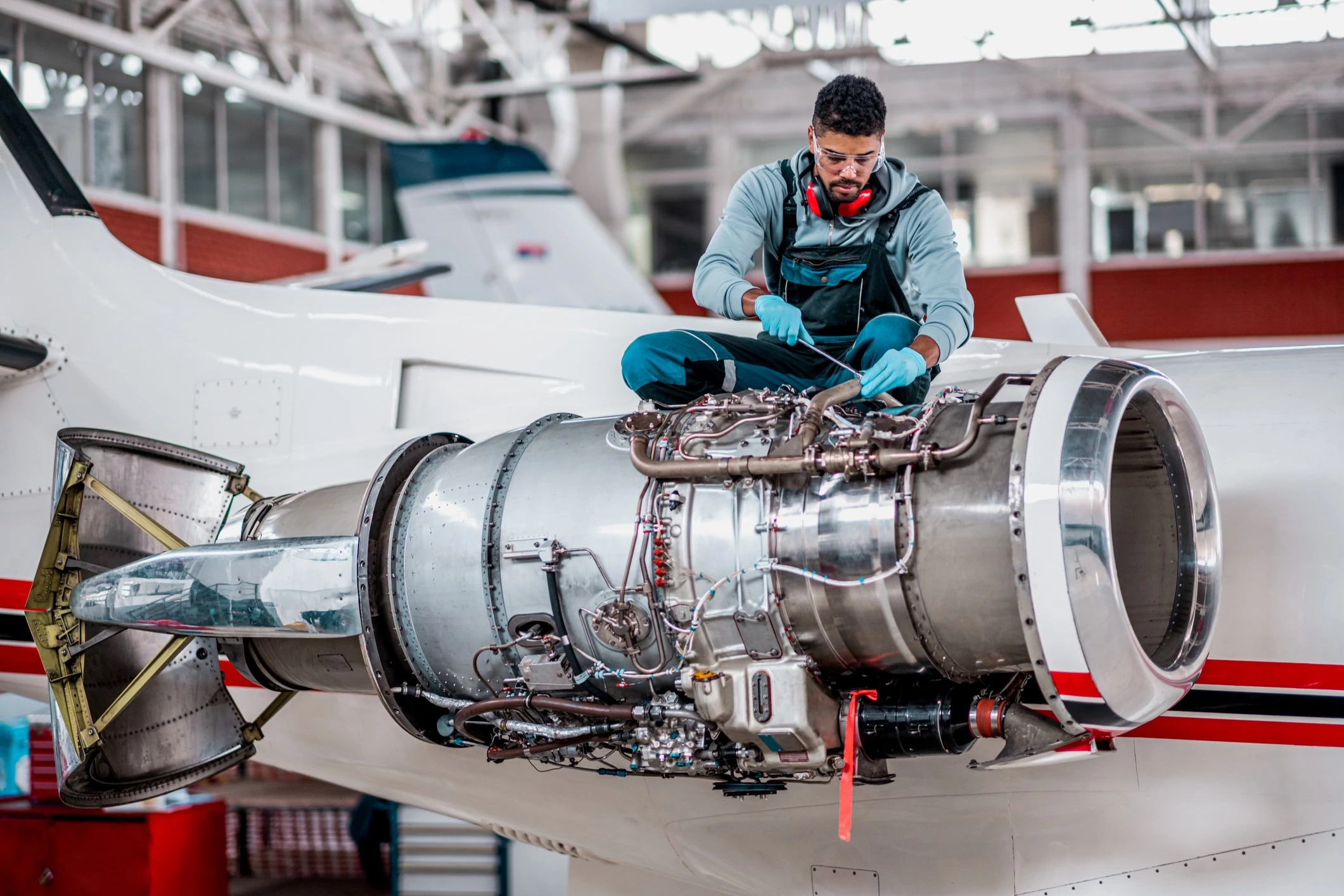How Much Does Aviation Maintenance Technology Make: Salary Insights
Aviation maintenance technology is a crucial field. It ensures aircraft safety and efficiency.
So, how much does aviation maintenance technology make? On average, aviation maintenance technicians earn a solid income. Their salaries vary based on experience, location, and certifications. Aviation maintenance technology plays a vital role in the aviation industry. Technicians inspect, repair, and maintain aircraft, ensuring they meet safety standards.
This demanding job requires specialized skills and training. Because of this, it often offers competitive pay. Factors such as years of experience, job location, and specific certifications can influence earnings. Understanding the potential salary can help you decide if this career path is right for you. In this blog post, we’ll delve into the earnings of aviation maintenance technicians and what affects their pay.
Introduction To Aviation Maintenance Technology Salaries
Aviation maintenance technology is a crucial field in the aviation industry. It ensures the safety and efficiency of aircraft. If you are considering a career in this field, knowing the potential salary can help you make an informed decision. Let’s dive into the details of aviation maintenance technology salaries.
Role Overview
Aviation maintenance technicians are responsible for inspecting, repairing, and maintaining aircraft. They work on various components, including engines, landing gear, and avionics. Their role is vital for keeping aircraft in optimal condition. They follow strict guidelines and safety protocols. This ensures that every flight is safe for passengers and crew.
Importance In Aviation Industry
The aviation industry relies heavily on maintenance technicians. These professionals keep aircraft operational and safe. Without them, air travel would not be as reliable or safe. Their work supports airlines, cargo carriers, and private aviation companies.
Given their importance, aviation maintenance technicians earn competitive salaries. Their skills and expertise are in high demand. This demand often translates to higher pay and job security.
| Experience Level | Average Salary |
|---|---|
| Entry-Level | $40,000 – $50,000 per year |
| Mid-Level | $50,000 – $70,000 per year |
| Senior-Level | $70,000 – $90,000 per year |
- Entry-Level: Technicians with less than 2 years of experience earn between $40,000 and $50,000 per year.
- Mid-Level: Those with 2-5 years of experience can expect to earn between $50,000 and $70,000 per year.
- Senior-Level: Technicians with over 5 years of experience can earn between $70,000 and $90,000 per year.
These figures are estimates and can vary based on location, employer, and specific job duties. Some technicians may earn more with additional certifications or specialized skills.
Factors Influencing Salaries
Salaries in aviation maintenance technology are influenced by various factors. Understanding these can help you navigate your career path more effectively. Here, we will explore some key factors affecting salaries, including experience level, geographic location, and type of employer.
Experience Level
Your experience level plays a crucial role in determining your salary. Entry-level technicians usually earn less compared to seasoned professionals. Here’s a breakdown:
| Experience Level | Average Salary |
|---|---|
| Entry-Level (0-2 years) | $40,000 – $50,000 |
| Mid-Level (3-5 years) | $50,000 – $60,000 |
| Senior-Level (5+ years) | $60,000 – $80,000 |
Geographic Location
Geographic location significantly impacts salaries in aviation maintenance technology. Technicians in urban areas or regions with high demand often earn more. Let’s look at some examples:
- California: $60,000 – $80,000
- Texas: $55,000 – $75,000
- Florida: $50,000 – $70,000
Type Of Employer
The type of employer also affects your salary. Working for major airlines or aerospace companies typically offers higher pay. Here’s a comparison:
| Employer Type | Average Salary |
|---|---|
| Major Airlines | $70,000 – $90,000 |
| Smaller Airlines | $50,000 – $70,000 |
| Private Companies | $60,000 – $80,000 |
Understanding these factors can help you make informed career choices in aviation maintenance technology. Keep these in mind as you plan your future.
Entry-level Salary Expectations
Starting a career in aviation maintenance technology can be exciting. Understanding the entry-level salary expectations is crucial. This helps in making informed career decisions. Let’s dive into what you can expect.
Average Starting Salaries
The average starting salary for an aviation maintenance technician varies. It depends on location, employer, and experience. On average, the starting salary is around $45,000 to $50,000 per year.
In some regions, entry-level technicians may earn slightly less. In others, especially in high-demand areas, salaries can be higher. Below is a table showing average starting salaries in different states:
| State | Average Starting Salary |
|---|---|
| California | $50,000 |
| Texas | $48,000 |
| Florida | $47,000 |
| New York | $49,000 |
Training And Certification Impact
Training and certification greatly impact salary expectations. Completing an FAA-approved training program boosts salary potential. Certification can also open doors to better job opportunities.
There are several certifications that can enhance your career:
- A&P Certification (Airframe and Powerplant)
- Avionics Technician Certification
- Inspection Authorization (IA)
Certified technicians often start with higher salaries. This could be an additional $5,000 to $10,000 annually compared to non-certified peers. Investing in training and certification pays off in the long run.
Here is a list of benefits of certification:
- Higher starting salary
- Better job opportunities
- Increased job security
- Potential for career advancement
In summary, entry-level salary expectations in aviation maintenance depend on various factors. These include location, training, and certification. Investing in your education and credentials can significantly boost your earning potential.

Credit: www.thrustinstitute.com
Mid-career Salary Potential
Exploring a career in Aviation Maintenance Technology is a great choice for many. The salary potential in this field can grow significantly over time. Mid-career professionals often see a notable increase in their earnings, thanks to experience and advanced skills.
Typical Mid-career Earnings
For mid-career professionals in Aviation Maintenance Technology, earnings typically range from $50,000 to $70,000 per year. This range can vary based on factors such as location, employer, and level of experience. Below is a table that outlines the typical mid-career earnings in different regions:
| Region | Typical Mid-Career Salary |
|---|---|
| North America | $55,000 – $75,000 |
| Europe | $50,000 – $70,000 |
| Asia | $45,000 – $65,000 |
Specialization And Advanced Skills
Specialization and advanced skills can greatly impact salary potential. Professionals with expertise in areas such as avionics, jet engines, or composite materials often command higher salaries. Here are some examples of specializations and their potential impact on earnings:
- Avionics Technician: Specializing in avionics can increase earnings to $60,000 – $80,000 per year.
- Jet Engine Specialist: Focusing on jet engines can lead to salaries of $65,000 – $85,000 annually.
- Composite Materials Expert: Expertise in composite materials can result in earnings of $70,000 – $90,000 per year.
Gaining certifications and advanced training can also boost salary potential. Many mid-career professionals pursue additional certifications to enhance their skills and increase their marketability. Below are some common certifications that can lead to higher earnings:
- FAA Airframe and Powerplant (A&P) Certification
- Avionics Technician Certification
- Certified Aircraft Maintenance Technician (CAMT)
Investing in education and gaining experience in specialized areas can pay off in the long run. Mid-career professionals who continue to develop their skills and knowledge often see significant salary growth.
Senior And Specialized Roles
In the field of aviation maintenance technology, senior and specialized roles offer lucrative salaries. These positions require advanced skills, experience, and often additional certifications. Here, we will explore some of the top paying positions and leadership roles in this industry.
Top Paying Positions
Senior and specialized roles in aviation maintenance technology command high salaries. Here are some of the top paying positions:
- Aircraft Maintenance Managers: They oversee maintenance operations and ensure compliance with regulations. Their average salary is around $90,000 per year.
- Avionics Technicians: They specialize in aircraft electronics and earn about $70,000 annually.
- A&P Mechanics: With years of experience, they can make up to $60,000 per year.
Leadership And Management Roles
Leadership roles in aviation maintenance technology come with greater responsibilities and higher pay. These roles include:
- Director of Maintenance: They lead the entire maintenance department, making strategic decisions. Their salary can exceed $100,000 per year.
- Quality Assurance Managers: They ensure maintenance meets safety standards. Their average salary is around $85,000 per year.
- Maintenance Supervisors: They manage teams of technicians and earn about $75,000 annually.
These senior roles require strong leadership skills and extensive experience. As a result, they offer competitive salaries in the aviation maintenance industry.

Credit: www.tccd.edu
Comparing Salaries By Region
When comparing aviation maintenance technology salaries, the region plays a key role. Different regions offer various salary ranges due to local economies, demand, and cost of living. This section will break down the salaries by region, providing a clear picture of what you can expect.
North America
In North America, aviation maintenance technicians often earn high salaries. The demand for skilled technicians is consistent. The average salary in the United States is around $65,000 per year.
| Country | Average Salary (USD) |
|---|---|
| United States | $65,000 |
| Canada | $60,000 |
Europe
In Europe, salaries for aviation maintenance technicians vary. Western Europe tends to offer higher salaries compared to Eastern Europe. The average salary in Germany is about €50,000 per year.
| Country | Average Salary (EUR) |
|---|---|
| Germany | €50,000 |
| United Kingdom | £45,000 |
| France | €47,000 |
Asia-pacific
The Asia-Pacific region shows a wide range in salaries. Countries with more developed aviation industries pay higher. In Australia, the average salary is around AUD 70,000 per year.
| Country | Average Salary (Local Currency) |
|---|---|
| Australia | AUD 70,000 |
| Japan | JPY 5,000,000 |
| China | CNY 200,000 |
Additional Benefits And Perks
Working in aviation maintenance technology offers more than just a paycheck. There are numerous additional benefits and perks that come with the job. From health and retirement plans to job stability and growth opportunities, these incentives make aviation maintenance an attractive career choice.
Health And Retirement Benefits
Aviation maintenance technicians often receive comprehensive health benefits. These usually include medical, dental, and vision insurance. Companies understand the importance of keeping their employees healthy. So, they offer plans that cover a wide range of medical needs.
Retirement benefits are also a significant perk in this field. Many companies offer 401(k) plans with employer matching. This means the company contributes to your retirement savings, increasing the amount you save over time. Some employers even offer pension plans, providing additional financial security for your future.
Job Stability And Growth Opportunities
The aviation industry is known for its job stability. Technicians are always in demand to keep aircraft safe and operational. This demand ensures that job opportunities remain steady. Even during economic downturns, the need for skilled technicians remains high.
Growth opportunities in aviation maintenance technology are abundant. Technicians can advance to higher positions such as lead mechanic or supervisor. Some may even move into specialized roles, such as avionics technician or inspector. Companies often provide training and development programs to support career advancement.
Here’s a look at some key benefits:
- Comprehensive health insurance
- Retirement plans with employer matching
- Job stability
- Career advancement opportunities
- Specialized training programs
These benefits and perks make a career in aviation maintenance technology rewarding. They ensure not only a steady income but also a secure and fulfilling professional life.
Future Salary Trends
The aviation maintenance technology field is evolving rapidly. This evolution impacts future salary trends. As technology advances and the industry grows, salaries are expected to follow suit. This section will explore these trends, providing a clear outlook on future earnings.
Impact Of Technology Advancements
Technology advancements play a significant role in shaping future salary trends. New tools and systems are making the job more efficient. This efficiency leads to higher productivity, which can result in salary increases.
For example, the integration of AI and machine learning in maintenance tasks reduces manual labor. This shift requires workers to have advanced skills. Higher skill levels often lead to better pay. Robotics and automation are also changing the landscape. Technicians who master these technologies are in high demand. This demand translates to higher salaries.
Here’s a quick overview:
| Technology | Impact on Salary |
|---|---|
| AI and Machine Learning | Increases due to higher skill requirements |
| Robotics | Higher pay for specialized knowledge |
| Automation | Increases due to efficiency and productivity |
Industry Growth And Demand
The aviation industry is growing steadily. This growth impacts salaries positively. As more planes take to the skies, the demand for maintenance technicians rises. More demand means better job security and higher pay.
Consider these factors:
- Increase in air travel
- Expansion of airline fleets
- Globalization and international travel
Each factor contributes to higher demand for skilled technicians. Airlines compete to attract the best talent. Competitive salaries are a key tool in this competition. As a result, those in aviation maintenance technology can expect their earnings to grow.
Let’s summarize the key points:
- New technology requires advanced skills.
- Higher skill levels lead to better pay.
- Industry growth increases demand for technicians.
- Increased demand results in higher salaries.
In conclusion, staying updated with technology and industry trends is crucial. Doing so will ensure continuous growth in your career and salary.

Credit: westkentucky.kctcs.edu
Frequently Asked Questions
What Is The Average Salary For Aviation Maintenance Technology?
The average salary for aviation maintenance technology professionals is around $60,000 per year. This can vary based on experience, location, and employer.
How Much Do Entry-level Aviation Maintenance Technicians Make?
Entry-level aviation maintenance technicians typically make around $40,000 per year. This can increase with experience and additional certifications.
Do Aviation Maintenance Technicians Earn More With Certifications?
Yes, aviation maintenance technicians earn more with certifications. Certified technicians can see salaries increase by 10-20%.
What Factors Affect Aviation Maintenance Technician Salaries?
Factors affecting salaries include experience, location, certifications, and employer type. Technicians in metropolitan areas often earn more.
Conclusion
Aviation maintenance technology offers a rewarding career with competitive pay. Salaries depend on experience, location, and certifications. Many technicians earn a stable income and enjoy job security. The field continues to grow, providing numerous opportunities. Those passionate about aviation can find fulfillment in this career.
Overall, aviation maintenance is a promising and lucrative profession.






